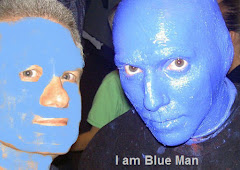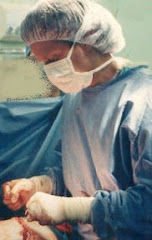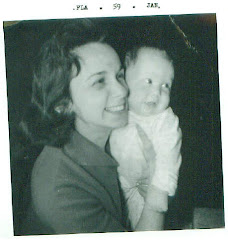"You suck!" That's what he said. I've certainly had good days and off days, but this was a mostly innocuous event in surgery that had no ramification to the success or failure of the procedure. It was a hand movement that provoked it. A totally over the top comment on a minor event. Did he think it would make be better?
I've really become sensitive to bad behavior in medicine today. I'm really tired of how we treat each other in the hospital and the effect it has on morale, work productivity and potentially, patient safety and care.
"He comes to the operating room late, greets no one, and
berates the nurse for not setting up the stepstools the way he likes. He tells
the [assistant] he doesn’t know the anatomy and sighs when she adjusts her grip
on a surgical tool. He slaps the hand of the [surgical tech] when she reaches
for the retractor to pull back skin for a clearer view. The operating room is [quiet and] tense for hours."
There is a profound disrespect that abounds in the medical setting, particularly where new or student providers are present. The bullying culture of medicine is well, well known. If you haven't experienced mistreatment, you've seen it regularly. There becomes a subculture of talk about the "crazy" surgeon, who you like and don't like to work with, and the effects of such behavior on colleagues and staff.
"For the most part, I’ve been pleasantly surprised. The
majority of doctors, nurses, and other health care professionals I’ve worked
with have been courteous and respectful: strong teachers and compassionate
caregivers. I have met colleagues whom I would feel honored to work alongside
in the future and mentors whom I’d want to treat my own family should they
become ill."
So I've learned to deal with the daily mistreatment. It seems to be the way it goes and has to be done. I've done the blow off explanation of that's "how he (or she) is" or "he's having a bad day" or "his mother is in the hospital". I've bonded with other staff over these incidents ('looks like you need a hug") and had conversations of "solidarity" with staff and colleagues about it. Worst, I've trained myself to ignore it, take it, swallow it, and (hopefully) get over it.
I often wonder thought what we aren't doing, what we miss and what we do in error from the effects of the fear and trepidation created in such environments. I think we rush to do things "more" right, more quickly and more expertly when we are chastised and often to the neglect of good procedure that really shouldn't be rushed. Is the environment created by these bullies making people so nervous that they can't really do their job correctly? I think so. And unfortunately I've seen evidence of that recently in the OR.
I can't remember a time in medicine when cooperation, respect, and relationship among colleagues and staff was more important. It takes a team to make medicine happen, particularly in surgery.
"Now, enter the culture of disrespect.
Suppose an attending physician makes withering critiques or unreasonable
requests. A resident, hoping to avoid such abuse, slowly but surely starts to
hold back. She holds back some questions for fear of burdening and, under the constant
stress of being scolded, becomes immersed in details of efficiency."
"A substantial body of data attributes medical errors to
interactions among hospital workers. Calls for improved patient safety gained
traction from the late 1980s through the early ’90s, when Australian
researchers reported a shocking find: the vast majority of medical errors, some
70‑80
per cent, are related to interactions within the health care team." If that is the case, then bullies create environments that have the potential to create error.
"The link between harsh words and medical errors was
reignited in 2012 when Lucian Leape, professor of health policy at the Harvard
School of Public Health, published a two-part series in Academic Medicine. ‘A
substantial barrier to progress in patient safety is a dysfunctional culture
rooted in widespread disrespect,’ Leape and his co-authors asserted.
‘Disrespect is a threat to patient safety because it inhibits collegiality and
co-operation essential to teamwork, cuts off communication, undermines morale,
and inhibits compliance with and implementation of new practices.’"
"When
anger and intimidation flow down, information stops flowing up. The chain of
communication becomes clogged." Some of the most popular reasons for lac of communication in the hospital setting,
according to research: Intimidation. Fear of confrontation. Concerns
about retaliation.
"When someone is unpleasant or demeaning, something switches
in the minds of those on the receiving end: they sacrifice honest communication
to save face. I’ve seen it in action so many times that the pattern has become
predictable. Preoccupied with fear of appearing incompetent, team members keep
uncertainties under wraps."
"Many in medicine actively protect the culture of disrespect
because they hold a fundamentally flawed idea: that harshness creates
competence". I am experiencing such a shameful experience now. No new competence comes from harsh, disrespectful communication. "Brutality doesn’t make better doctors; it just makes
crankier doctors. And shame doesn’t foster improvement; it fosters more
mistakes and more near-misses. We know now that clinicians working in a culture
of blame and punishment report their errors less often, pointing to fear of
repercussion. Meanwhile, when blame is abolished, reporting of all types of
errors increases."
"Bad cultures lead to bad
outcomes. Jerks do not make good medicine. They foster a backwards atmosphere
that degrades trust, tarnishes open communication, and promotes cover-ups."
I wish I knew how to stop disruptive behavior. But likely if I speak out about it, I'll be dismissed so that the disruptive surgeon bringing in financial benefit to the hospital can continue to rant and rave. Thus facilitating the behavior it hopes to eliminate.
"We can’t ignore a system that takes loads of formerly ‘nice’
people and churns out jaded, bitter, and gruff ones" I yearn for a hospital culture that shames bullying making the bully look like the bad guy, rather
than making the recipient look weak.
There is not quick fix, but I for one, am beat up enough for a lifetime. And I don't think I'm a better provider for it. Maybe I just suck.




